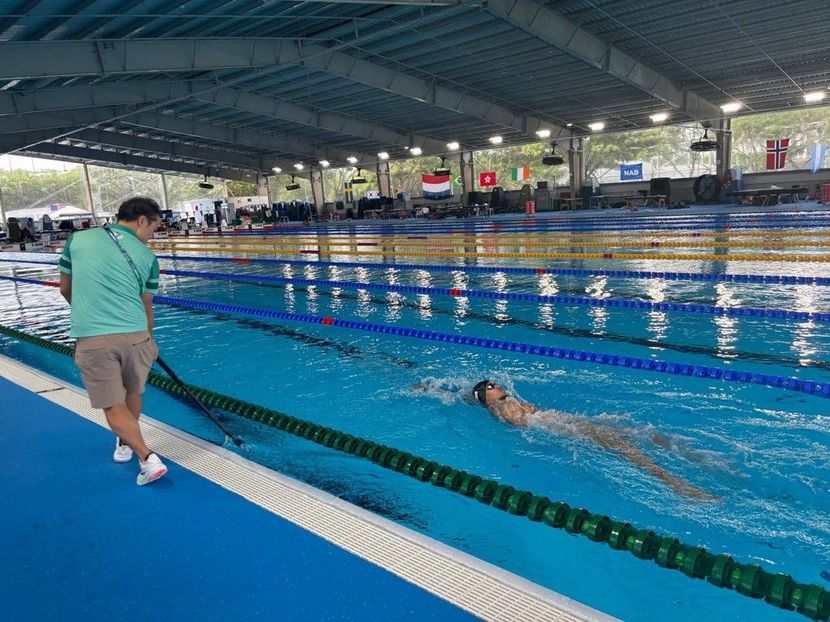
At the World Aquatics Championships – Singapore 2025, as part of the Development programme schedule, athletes have the opportunity to receive in-depth biomechanical analysis from one of the sport’s leading experts, Russell Mark.
Mark, the former USA Swimming High Performance Manager, is a world leader in swimming analysis. From 27 July to 3 August, he is stationed at the World Championships Arena training pool, working directly with athletes to improve their performance using video and velocity-based data. He also works with the World Aquatics scholarship holders on a regular basis throughout the year, visiting training centres to offer analysis.
World Aquatics sat down with Russell to learn more about his work in Singapore and the future of performance analysis in swimming.
Q: Russell, can you tell us what biomechanical analysis involves and what you’re doing here in Singapore?
A; I’m here providing biomechanical feedback for athletes – collecting underwater video, capturing velocity data and analysing their stroke mechanics in detail. The idea is to bring this service to as many people as possible, particularly from developing nations who might not otherwise have access to this extent of support.
I’m thankful to World Aquatics and its Development Team for making this opportunity available. The athletes and coaches have been so appreciative. I love sharing knowledge and helping people swim faster. Swimming really brings people together – and these World Aquatics Championships show just how powerful that can be.
Q: What does a typical analysis session look like? What tools are you using?
A: The sessions usually start with me filming the athlete underwater while they’re swimming fast, so I can capture real race-like conditions. I focus on the technical aspects of their strokes – particularly things like the dolphin kick or underwater phase.
I then analyse the footage and share it with both the athlete and their coach. It’s important to me that they have key technical takeaways that they can work on. I also use a velocity metre to track their speed and generate data points during their swim. This helps us understand their velocity profile, especially in underwater sections and how it compares to elite benchmarks.
Q: You’ve had an extensive career in swimming. Can you give us some background?
A: Swimming has always been a big part of my life. I swam competitively through university, then worked briefly in engineering before joining USA Swimming. I spent 20 years there, went to five Olympic Games, and had the privilege of working closely with incredible athletes.
All of that experience has given me insights that I’m now lucky enough to share. It’s a great feeling to contribute in this way and I’m truly grateful to World Aquatics for the opportunity to keep doing it.
Q: How do you see swimming evolving over the next 10 years?
A: The sport is only going to keep getting faster. We’re seeing higher standards across the board. What’s exciting is that data and video are now far more accessible than ever before. We’ve got more tools, and more people who know how to interpret and apply the data effectively.
Everyone’s always worked hard in swimming, but now we can point that hard work in a very specific direction.
Athlete Insight: Jayden Loran
World Aquatics also spoke to Jayden Loran, a breaststroke swimmer from Curaçao, who has been part of the World Aquatics Scholarship Programme for the past two years. He recently worked with Russell Mark during the World Aquatics Championships in Singapore.
Q: How’s your experience at the World Aquatics Championships in Singapore so far, Jayden?
A: It’s been great. I swam the 100m breaststroke and I’ve got the 50m tomorrow – so hopefully that goes well with a good night’s rest!
Q: Tell us about your journey with the Scholarship Programme.
A: I’m super glad to be part of it. It’s an amazing programme, especially for athletes from smaller countries who want to compete on the world stage.
The coaching back home is good, but being part of this programme has really fine-tuned my technique. The training environment is also a big plus – working with people who have the same mindset and goals as you really motivates you.
Q: And how has the biomechanical analysis helped you specifically?
A: It’s been incredibly helpful. I’ve worked with Russell before – in Doha and Budapest – and now here in Singapore. The way he communicates with both me and my coach is so clear. He points out exactly what we need to work on, and that’s made a real difference in improving my breaststroke.
Stroke analysis like this is really important for athletes.